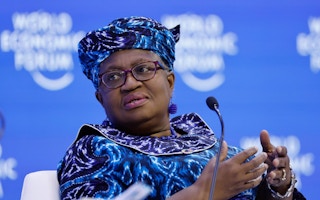The head of the World Trade Organization (WTO) has called for a global carbon tax and reforms to trade regulations to enable the world to meet decarbonisation goals this decade.
To continue reading, subscribe to Eco‑Business.
There's something for everyone. We offer a range of subscription plans.
- Access our stories and receive our Insights Weekly newsletter with the free EB Member plan.
- Unlock unlimited access to our content and archive with EB Circle.
- Publish your content with EB Premium.
Speaking at the World Economic Forum in Davos last week, WTO director-general Ngozi Okonjo-Iweala said many countries tend to impose higher tariffs on clean goods but lower tariffs on carbon-intensive goods, which skews trade towards “dirtier products”.
Carbon-heavy trade policies result in an “implicit subsidy” of US$550 billion-US$800 billion per year for carbon dioxide production, said the Nigerian economist.
Removing the carbon trade bias would reduce global carbon emissions by 3.6 per cent while increasing global income by 0.65 per cent, estimated Okonjo-Iweala, who is the first woman and first African to run the WTO.
“
Trade policy skews in favour of dirtier products.
Ngozi Okonjo-Iweala, director-general, World Trade Organization
Okonjo-Iweala said she has been appealing to WTO members to strengthen efforts to liberalise trade and environmental good and services, bearing in mind all the sensitivities of developing countries.
Decarbonising global trade and supply chains must occur in a way that “leaves no one behind,” she insisted.
Low-income nations will need to obtain both “the capacity and infrastructure to demonstrate the low carbon content of their goods,” she said.
Her comments come a month after the European Union introduced a new law to weed deforestation out of European supply chains by clamping down on forest-risk imports. The law has been bitterly opposed by palm oil-producing nations Malaysia and Indonesia. Both countries have complained to the WTO over regulations they say are “discriminatory” and “protectionist” and will lead to a rise in poverty by marginalising smallholder farmers.
Protectionism has prompted global trade growth to fall from 3.5 per cent in 2022 to just 1 per cent this year, Okonjo-Iweala said in an interview with CNN on the sidelines of Davos.
A shared price on carbon
Okonjo-Iweala also called for a shared global price on carbon.
There are currently around 70 national carbon pricing schemes worldwide, including emissions trading systems and carbon taxes. Okonjo-Iweala said that the large number of such “fragmented” schemes has led to uncertainty and concerns among businesses.
The WTO is working with the World Bank, the Organisation for Economic Co-operation and Development (OECD), and International Monetary Fund to evaluate how to consolidate carbon pricing globally, she said.
“I remain convinced that a shared global carbon-pricing framework would best provide certainty for businesses and predictability for developing countries,” said Okonjo-Iweala.
Failure to implement a global carbon price and carbon trade tax reform risked the world missing 2030 climate targets, Okonjo-Iweala warned.
To keep global warming to no more than 1.5°C – as called for in the Paris climate accord – carbon emissions need to be cut by 45 per cent by 2030. Emissions from burning fossil fuels rose by 1 per cent last year.
This story is part of Eco-Business’ coverage of the World Economic Forum Annual Meeting in Davos.










